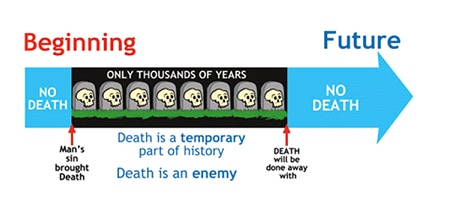Creationism, in all of its guises, from young earth creationism to intelligent design and beyond, is so clearly at odds with the modern scientific worldview that parodies of those who promote creationism abound. Even more than a disagreement over supposed scientific "facts," the biggest problem with all of creationism is that its proponents want to redefine science in a way that makes the subject completely meaningless.
What would be outrageously funny about this, if it weren't so incredibly sad, is that even the most extreme parodies of the creationist position, have to be taken seriously. For example, here's one such example making its way around the Web:

Funny, right? Well, given that many creationists have a completely perverted perspective on entropy and the laws of physics, this parody isn't, in fact, a parody. Because, in addition to the disgraceful war on women the Republican presidential candidates seem intent on waging, they are also attacking evolution and the very nature of public education. Education, in the universe they're currently inhabiting, should be entirely up to parents. Parents, they say, are in the best position to determine the individual needs of their children.
So, let's look at the world's leading creationist organization, Answers in Genesis (AiG) -- the folks who brought us the Creation Museum-cum-theme-park in Kentucky, and see what they have to say about entropy and the laws of physics.
Simply put, those laws dictate how energy is transferred through the environment and they explain why entropy, or the amount of disorder in a system, always increases unless energy is added to the system. Those laws explain why perpetual motion machines cannot exist, why all living things ultimately die and so much more.
Or do they?
Well, not really, not if you're Ken Ham, director of AiG, or many of his employees. Just recently in an hour long radio interview in which he criticized The Clergy Letter Project, he explained his concern with clergy members who recognize that the Earth is billions of years old.
The question is where did sin come from? Because if there was no literal fall in Genesis, why are we a sinner? And if you believe in millions of years, you've got death and bloodshed millions of years before sin. The Bible says death came as a result of sin and if you're saying you can't take that history as written, and you're taking man's ideas of evolution of millions of years outside the Bible and you're reinterpreting God's word, you're ... undermining the authority of God's word.
Thus, Ken Ham makes it clear that the science he wants to teach is that death could not have occurred before sin. To have it any other way, as he puts it, is to "undermine the authority of God's word."
Because this is such a complicated concept, Ham has created a fancy graphic that explains the technical science to his lay audiences. Here's how he explained his view, a view at odds with that of the physics community, that the laws of physics are not constant:

That's pretty compelling evidence for overturning the laws of physics. Incorporating technical subjects into a home schooling regime thus seems fairly easy.
But, wait, even for Ham and AiG things get a bit more complicated. I'll let Ham explain how organisms feeding on other organisms can do so without death occurring:
When I make the claim that the Bible teaches there was no death before sin, I'm referring to the death and bloodshed of animals and humans. You see God created man and the animals to be vegetarian originally. There wasn't any physical death until after the fall. But if animals and man ate plants before sin, doesn't it mean there was death because plants died? Well, the Book of Genesis actually has the answer. It tells us that plants are not living in the same sense as animals are... They don't have the life principle that animals have. Plants were given for food so they don't die in the animal sense.
Got all that? Well, apparently not everyone at AiG got the message. Here's an AiG weekly news update from 2007 on the topic:
Some Christians say that even in the original creation, plants had to decay and Adam and Eve had to digest food. Therefore they say things were decaying before sin, so it wasn't a perfect world in the Garden of Eden!
It is reasonable to infer that in a perfect world, there was controlled decay, which is necessary for life. But once sin entered the world, things were no longer "perfect." Without the decay perfectly controlled, everything, including our own bodies, now runs down and decays.
Ok, so now we know that even in a perfect world decay occurs, well, "controlled decay" anyway. Why? Because AiG explains it "is necessary for life."
In fact, the folks at AiG go further and explain that some entropy is actually a good thing and thus it would have been present before sin. Here's a short extract from a piece AiG published in 2010 on the second law of thermodynamics:
We could not digest our food without the second law being in operation. The breaking down of food into simpler molecules is a consequence of this process. The molecules are broken down to release the energy that is used to maintain the body and even provide for growth.
Oh my. This confluence of physics, biology and theology is getting complex. Apparently we need to teach our students that some entropy is better than other entropy and that God rewarded us with the good stuff at the creation but punished us with other forms later because of our sinful nature. And, apparently, we are to ignore the fact that if the laws of thermodynamics didn't exist we actually wouldn't have to eat at all -- we could simply operate as perpetual motion machines. And we are to ignore the fact that if energy transfer could be 100 percent efficient, something ruled out by the laws of physics but something that should be present in the pre-sin "perfect world" envisioned by AiG, if we opted to eat, we certainly wouldn't have to eat much!
It doesn't end here. The same AiG writer who "explained" the difference between good entropy and bad entropy, provides us with another lesson on the topic. Even after sin, when death and destruction became a part of the human condition and animals began to suffer, there were periods when the laws of physics ceased to function, times when entropy no longer prevailed.
In the beginning, God sustained His creation in its perfect state. The account of the Israelites wandering in the wilderness provides a glimpse of how things might have been in the original creation. The garments of the Israelites did not wear out, nor did their feet swell for the forty years they camped in the desert (Deuteronomy 8:4). God is omnipotent and perfectly capable of sustaining and protecting His creation.
I could go on but my head hurts.
When we permit theology to define our science, we end up with gibberish, but not even consistent gibberish. Entropy is our punishment for sin, except when it isn't. Entropy is bad, except when it's good. Plants don't die when they stop living.
Please explain why we would turn over the responsibility for education to people like this, people who are beyond parody?
